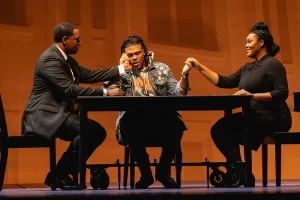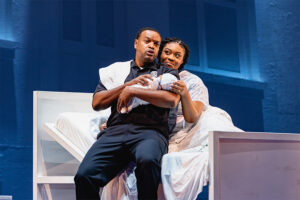
 **** When an artist has enormous feelings about a subject, opera is a natural vessel. Blue, which debuted in 2019, has a relatively small cast and is tightly focused on a three-person family. But it contains massive anger, bafflement, and grief at the unfairness and contradictions of American policing of Black people. With a libretto by director Tazewell Thompson and music by Jeanine Tesori, Blue tells the story of an everyman Black police officer whose son is slain by one of his fellow cops. It’s a very simple story, with little onstage action, but a profound tragedy.
**** When an artist has enormous feelings about a subject, opera is a natural vessel. Blue, which debuted in 2019, has a relatively small cast and is tightly focused on a three-person family. But it contains massive anger, bafflement, and grief at the unfairness and contradictions of American policing of Black people. With a libretto by director Tazewell Thompson and music by Jeanine Tesori, Blue tells the story of an everyman Black police officer whose son is slain by one of his fellow cops. It’s a very simple story, with little onstage action, but a profound tragedy.
The story begins with The Mother (mezzo-soprano Zoie Reams) hosting her chorus of “friends” to reveal her pregnancy. They weren’t aware that she had gotten married or had a partner at all, or that she owned the restaurant below the apartment. However, when she says the baby will be male, they chide her for being happy, stating that all Black males in America will inevitably be so miserable that it would be better for them not to be born at all, and tell her to abort it and try again for a girl. Despite the pointlessness and cruelty of these statements, The Mother still talks them into giving her their blessing, and reminds them that because her husband is a cop, she is very conscious that it’s impossible to know whether a loved one will come home at the end of the day, but she chooses to be hopeful.
As for The Father (bass Kenneth Kellogg), his friends are far more normal, ribbing him for all the baby diarrhea he’ll soon be acquainted with, but welcoming one of their own into the world as a good thing. The Father adores the baby, but as The Son (tenor Travon D. Walker) grows into a young man, emotional distance grows between them as they clash over politics, The Son’s willingness to endanger himself, and The Father’s choice of career. The Son wants leftwing social reforms and takes action ranging from protesting transit fees by jumping turnstiles to spitting on other cops; The Father counters that despite their pride in The Mother’s restaurant, they depend on his job for their dental coverage and that their current lives should be considered victory enough. The Son also points out that The Father uses his role as a material provider to excuse being emotionally cold, and on this, The Father admits he is at fault.
The second act is a meditation on loss and frustration, following The Son’s offstage death. The Father seeks counsel from The Reverend (baritone Norman Garrett), who talks him out of throwing away his life pursuing vengeance, but has no other ideas and seems to have never imagined a situation like this. Jeanine Tesori’s music, conducted by Joseph Young, is somber, sometimes jarring, and focused on inner tumult, but also contains moments of joy and humor. Tazewell Thompson’s writing and directing are a compassionate, nuanced family portrait of a still-immature young man with a burning sense of justice and parents who find life hard enough without fighting the world head-on. There are things about Blue that I thought were very 2019, and I don’t think I felt about all the non-family characters the way the creators wanted me to. However, I was also moved by The Father’s monologue in which he lists all the contradictory things Black men are told to do to look less threatening or suspicious. It’s an important advancement in opera for Black voices to be common and telling original stories, and Blue is a masterful composition built around a deep sense of passion.
Blue will continue at the Lyric Opera House, 20 N Upper Wacker Drive, Chicago, thru December 1, with the following showtimes:
 November 22: 7:00 pm
November 22: 7:00 pm
November 26: 7:00 pm
December 1: 2:00 pm
Running time is two hours and thirty minutes with one intermission. There is also a thirty-minute preview talk an hour before the show.
Performances are in English with supertitles.
Ticket prices start at $49. The Lyric offers parking deals with Poetry Garage at 201 W Madison St. if inquired about in advance. To order, visit LyricOpera.org or call 321-827-5600.
To see what others are saying, visit www.theatreinchicago.com, go to Review Round-Up and click “Blue.”






More Stories
“The Firebugs” reviewed by Julia W. Rath
“The Book of Grace” Al Bresloff with another from Paul LIsnek
“The Last Five Years” MILWAUKEE